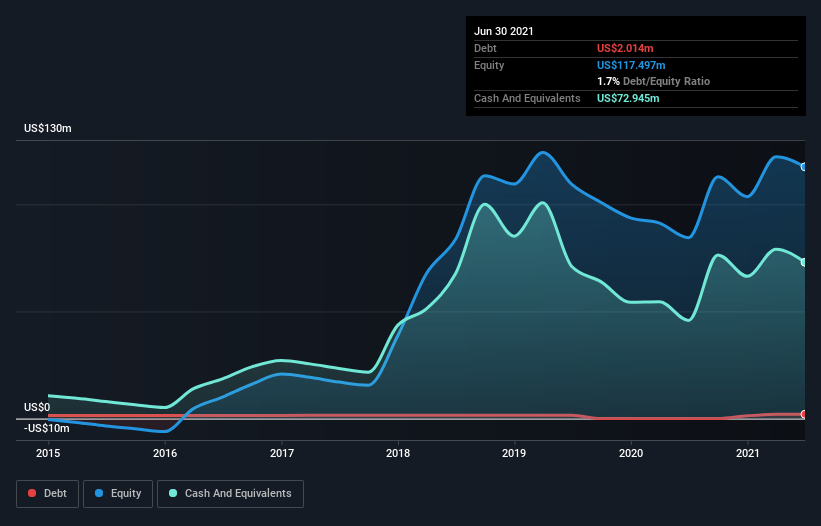Despite Lacking Profits CASI Pharmaceuticals (NASDAQ:CASI) Seems To Be On Top Of Its Debt
The external fund manager backed by Berkshire Hathaway's Charlie Munger, Li Lu, makes no bones about it when he says 'The biggest investment risk is not the volatility of prices, but whether you will suffer a permanent loss of capital.' So it might be obvious that you need to consider debt, when you think about how risky any given stock is, because too much debt can sink a company. Importantly, CASI Pharmaceuticals, Inc. (NASDAQ:CASI) does carry debt. But is this debt a concern to shareholders?
When Is Debt A Problem?
Generally speaking, debt only becomes a real problem when a company can't easily pay it off, either by raising capital or with its own cash flow. If things get really bad, the lenders can take control of the business. However, a more common (but still painful) scenario is that it has to raise new equity capital at a low price, thus permanently diluting shareholders. Of course, debt can be an important tool in businesses, particularly capital heavy businesses. When we think about a company's use of debt, we first look at cash and debt together.
View our latest analysis for CASI Pharmaceuticals
What Is CASI Pharmaceuticals's Net Debt?
You can click the graphic below for the historical numbers, but it shows that as of June 2021 CASI Pharmaceuticals had US$2.01m of debt, an increase on none, over one year. But it also has US$72.9m in cash to offset that, meaning it has US$70.9m net cash.
How Healthy Is CASI Pharmaceuticals' Balance Sheet?
We can see from the most recent balance sheet that CASI Pharmaceuticals had liabilities of US$10.0m falling due within a year, and liabilities of US$17.0m due beyond that. Offsetting this, it had US$72.9m in cash and US$5.77m in receivables that were due within 12 months. So it actually has US$51.7m more liquid assets than total liabilities.
This excess liquidity is a great indication that CASI Pharmaceuticals' balance sheet is almost as strong as Fort Knox. With this in mind one could posit that its balance sheet means the company is able to handle some adversity. Succinctly put, CASI Pharmaceuticals boasts net cash, so it's fair to say it does not have a heavy debt load! When analysing debt levels, the balance sheet is the obvious place to start. But ultimately the future profitability of the business will decide if CASI Pharmaceuticals can strengthen its balance sheet over time. So if you're focused on the future you can check out this free report showing analyst profit forecasts.
Over 12 months, CASI Pharmaceuticals reported revenue of US$22m, which is a gain of 115%, although it did not report any earnings before interest and tax. So its pretty obvious shareholders are hoping for more growth!
So How Risky Is CASI Pharmaceuticals?
Statistically speaking companies that lose money are riskier than those that make money. And we do note that CASI Pharmaceuticals had an earnings before interest and tax (EBIT) loss, over the last year. Indeed, in that time it burnt through US$54m of cash and made a loss of US$52m. But at least it has US$70.9m on the balance sheet to spend on growth, near-term. Importantly, CASI Pharmaceuticals's revenue growth is hot to trot. While unprofitable companies can be risky, they can also grow hard and fast in those pre-profit years. There's no doubt that we learn most about debt from the balance sheet. But ultimately, every company can contain risks that exist outside of the balance sheet. For instance, we've identified 2 warning signs for CASI Pharmaceuticals that you should be aware of.
When all is said and done, sometimes its easier to focus on companies that don't even need debt. Readers can access a list of growth stocks with zero net debt 100% free, right now.
This article by Simply Wall St is general in nature. We provide commentary based on historical data and analyst forecasts only using an unbiased methodology and our articles are not intended to be financial advice. It does not constitute a recommendation to buy or sell any stock, and does not take account of your objectives, or your financial situation. We aim to bring you long-term focused analysis driven by fundamental data. Note that our analysis may not factor in the latest price-sensitive company announcements or qualitative material. Simply Wall St has no position in any stocks mentioned.
Have feedback on this article? Concerned about the content? Get in touch with us directly. Alternatively, email editorial-team (at) simplywallst.com.

